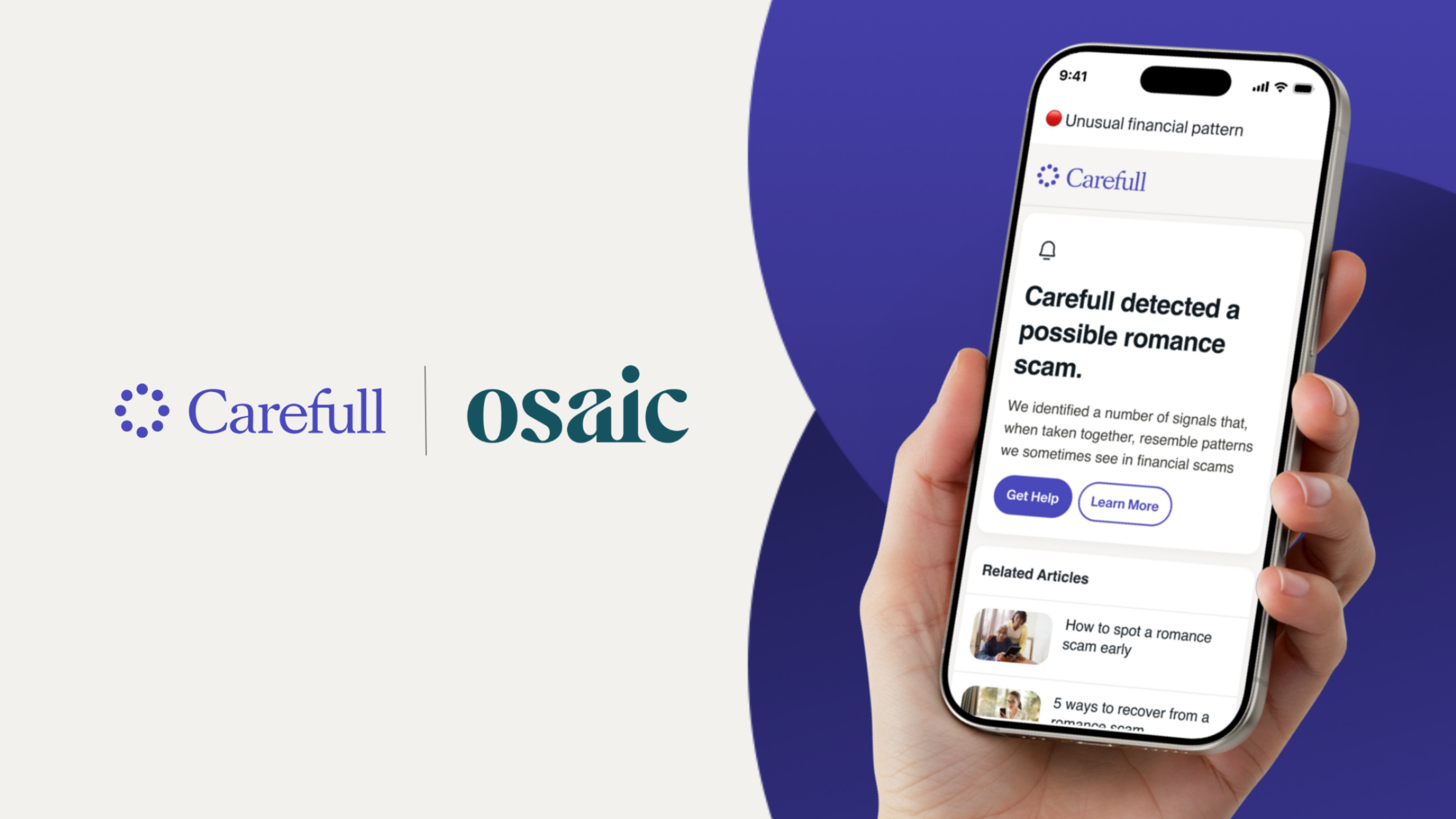How Banks and Advisors Can Unlock the Older Adult Opportunity

Carefull is on a mission to protect the daily finances of older adults and their financial caregivers. It recently shared this mission with banks, credit unions, financial advisors and association partners as part of a webinar through CBANC—“Seniors & Banking: How To Unlock the Value of Your Most Valuable Customers.”
During the webinar, Carefull co-founder Todd Rovak explained the challenges and risks older adults face when it comes to their finances, the opportunities for investing in them and why financial institutions need to do more to engage with this segment of the population. Then a panel of financial and legal experts—Carefull Director of Education and Content Cameron Huddleston, Shannon Miller, a board certified elder law attorney and founder of The Miller Law Firm, and Pam Krueger, founder and CEO of fee-only financial advisor referral service Wealthramp—shared actionable solutions.
To better serve and protect this fast-growing, high-net-worth customer base and to unlock the potential that this generation offers to connect with younger generations, take the following five steps:
Train employees to detect and report elder financial exploitation
Detection of elder financial exploitation starts from within financial institutions. For banks and credit unions, that requires training all employees to spot the signs of exploitation and to report suspected cases to the proper authorities. It also can involve smart money-monitoring technology such as Carefull that makes it easier to detect unusual transactions and signs of fraud.
Financial institutions also need to ensure that their in-house wealth advisors are operating with the best interests of older customers in mind. Management and staff need to be able to intervene if they sense this isn’t happening.
If you are an advisor yourself or are leading an advisory group, educate yourself and your team on the risks clients face as they age so that you can play a role in reducing those risks. And adopt a policy to act as a fiduciary to serve your clients’ best interests, even if you aren’t legally bound to do so by your certification or licensing requirements.
Training not only is an investment in your staff, but also it can deliver financial benefits to your business. Less fraud because of better detection and intervention means less money lost and a higher retention of what Carefull refers to as “assets under protection.”
Use senior-specific technology to monitor for fraud and financial mistakes
Technology removes the onus on employees to catch every red flag. A service such as Carefull can provide 24/7 financial account, identity and credit monitoring and can alert you or your customers to unusual transactions and signs of fraud so they can intervene before it’s too late.
Technology is not a replacement for human interaction with customers. It’s an amplifier that empowers bankers and advisors to create more opportunities for engagement and to act as protectors. This ultimately builds greater trust and creates opportunities for generating new revenue streams that would otherwise be challenging to initiate.
Ensure older customers have trusted contacts
Advisors, attorneys and financial institutions all agree that trusted contacts are essential. Make sure that you are encouraging all adult customers to designate a trusted contact or contacts.
Then take it a step further by meeting with customers’ trusted contacts to ensure they can be trusted and to discuss the role they are expected to play. If you are working with a “solo senior” and they have no one to name in this role, guardianship programs exist in every state. Find one you believe in.
Not only are trusted contacts the first line of defense in protecting older adults and helping them manage their finances as they get older, but also they can be potential customers for financial institutions and advisors. By building a relationship with them through your existing clients, you can build a bridge to new generations.
Create or acquire content to educate older customers
Education of your staff is key. However, without educating your customers as well, it can be an uphill battle to make sure older adults are truly protected.
If you do not have an in-house content expert or author, you can work with companies such as Carefull that produce numerous articles that can educate older customers and their caregivers on protecting their money. Customers, especially older ones, trust their banks. That’s why banks should take an active role in informing customers about how to keep their money safe as they age. In particular, they should provide older customers with information about planning for incapacity, including the institution’s policy for naming a power of attorney so that legal permissions are in place before emergencies arise.
Create a strategy to foster ongoing engagement with older customers
Adding a senior checking account is no longer enough. Without engaging with older adults on a regular basis, you leave a highly valuable customer base at a higher risk of falling victim to fraud.
The added benefit of fostering engagement with older customers is that there is a greater likelihood of having them take advantage of your other products and services, such as wealth management, trust accounts and annuities that can help seniors create a reliable stream of retirement income.
For more information or advice on how to implement any of the above solutions, or to see Carefull in action and learn more about the service, fill out this form.

3 Steps to Safer Money,
Try it Free for 30 Days
Step 1
Start your free,
no-risk trial
Step 2
Connect the accounts and cards you want protected
Step 3
Stay alerted to any
unusual activity





.png)

